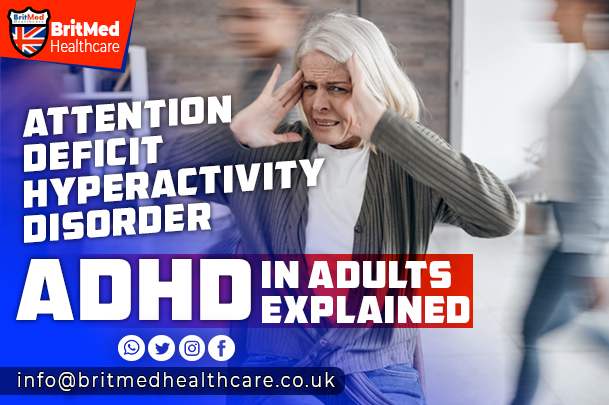Attention Deficit Hyperactivity Disorder – ADHD in Adults Explained
Attention Deficit Hyperactivity Disorder, ADHD, is a neurodevelopmental disorder characterized by symptoms of inattention, hyperactivity, and impulsivity that affect both children and adults. While the condition tends to be associated with children, ADHD does persist into adulthood, impinging on the daily life of the sufferer, his relationships, and career. According to the National Institute of Mental Health, an estimated 4% of adults in the United Kingdom have ADHD. This review aims to provide a broad overview of the treatment approaches for adult ADHD and to help people understand the options regarding different therapies and medications.
Understanding Adult ADHD
Adult ADHD is marked by symptoms of inattention, hyperactivity, and impulsivity. Sometimes these symptoms look very different from those apparent in children because they can become more subtle or masked. The common symptoms of adult ADHD include:
– Failure to sustain attention to tasks
-Distraction-inability to complete tasks
-Disorganization and procrastination
-Impulsivity and restlessness
-Failure in following instructions
-Disability in maintaining a relationship
Treatment Options for Adult ADHD
The generally usual treatment for adult ADHD includes a combination of medication and behavior therapy. The main purpose of the treatment is to bring relief to symptoms, enhance functioning, and improve general well-being.
Medications
There are several medications generally used in treating adult ADHD. The common ones include:
- Stimulants: These are drugs that raise levels of neurotransmitters in the brain, such as dopamine and norepinephrine. Examples include methylphenidate (Ritalin) and amphetamine (Adderall).
- Non-stimulants: These drugs affect neurotransmitter levels in the brain without raising them. Examples include atomoxetine (Strattera) and guanfacine (Intuniv).
- Alpha-2 agonists: These drugs act by inhibiting the action of some neurotransmitters within the brain. Examples of alpha-2 agonists are clonidine (Catapres) and guanfacine (Intuniv).
Behaviour Therapy
Behaviour therapy is a very important part of the treatment plan in adult ADHD. This kind of therapy helps the patient to develop coping techniques, while improving their organizational capabilities and enhancing self-esteem. Following are some of the common behaviour therapy techniques employed in adult ADHD treatment:
- Cognitive-behavioral therapy (CBT): In CBT, individuals learn to recognize and alter negative thought and behavior patterns.
- Behavioral activation: Behavioral activation is a kind of therapy where the individual is encouraged to participate in activities that are pleasurable to them and will help them obtain a sense of mastery.
- Mindfulness-based interventions: Mindfulness-based interventions, such as MBSR, may help individuals with ADHD manage associated stress and anxiety.
Combination Therapy
Adult ADHD treatment may be combination therapy. This may include the use of medication together with behaviour therapy for best results.
Behavioral Modifications in Lifestyle
Besides medication and behavior therapy, there are several other ways to modify lifestyles to manage symptoms of adult ADHD. They include:
- Regular Exercise: Regular exercise, especially aerobic exercises, has been proven to enhance symptoms of ADHD.
- Adequate Sleep: Adequate sleep is important and required for cognitive functioning and symptom management.
- Cultivate healthy behaviors: Teaching healthy behaviors, such as a routine daily plan, will help the individual with adult ADHD be more organized and on track.
- Engage social support: Keeping a close network of support will make individuals with adult ADHD feel less isolated and more secure.
Conclusion
Adult ADHD is a treatable condition, and the treatment needs to be holistic: medication, behavior therapy, and changing one’s life patterns. Understanding the various available options will help individuals with Adult ADHD to work out a treatment plan with their health practitioner that meets their particular needs and improve quality of life.
References:
https://my.clevelandclinic.org/health/diseases/4784-attention-deficithyperactivity-disorder-adhd
https://www.nimh.nih.gov/health/publications/adhd-what-you-need-to-know
https://www.nhs.uk/conditions/attention-deficit-hyperactivity-disorder-adhd/
Websites:
Britmed Healthcare: https://britmedhealthcare.co.uk/
Nightingale Hospital: https://www.nightingalehospital.co.uk/
Top Doctors: https://www.topdoctors.co.uk/doctor/ahmed-el-missiry
You can also book, Contact us on WhatsApp 08009708017




